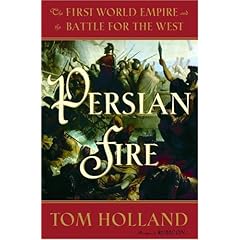
Guardian Unlimited Books: "Tom Holland showed in Rubicon, his book on Julius Caeasar and his age, that he could master a complex and fast-moving narrative from ancient history and make it a pleasure for both general readers and the learned. There is not nearly the same body of evidence for the Persian wars as there is for the breakdown of the Roman republic, but what there is is to die for.
Beside the nine books of Herodotus, there is Aeschylus's tragedy of 472BC, The Persians. The playwright had fought at the decisive sea-battle of Salamis and the high point of the drama is a report of the battle from the Persian point of view. There are also Plutarch's lives of the chief Athenian statesmen, and his account of the Spartan system of government, written much later under the Roman empire. From Iran, there are rock inscriptions of royal conquests above all at Bisitun in Kurdistan.
All the ancient sources are partial, with a bias towards Athens even in Herodotus, but Holland succeeds in writing an account that is clear and uncluttered. His technique is to present his narrative as an uncontested succession of events, and leave the evaluation of sources and the scholarly reservations to notes.
He likes to cut and splice Herodotus's account when the chronology doesn't suit his narrative purposes, but he explains what he is doing and the effect is often fresh and interesting. (The exception is at Salamis, which is a very hard battle to understand, and even harder when Holland introduces a complex Persian night manoeuvre that doesn't appear to be in any ancient source at all.) Similarly, the evacuation of Athens is full of anachronistic detail. But some of the set pieces, such as the charge of the Athenian heavy infantry at Marathon and the Persian army crossing the bridge of boats strung across the Dardanelles, are thrilling."
No comments:
Post a Comment